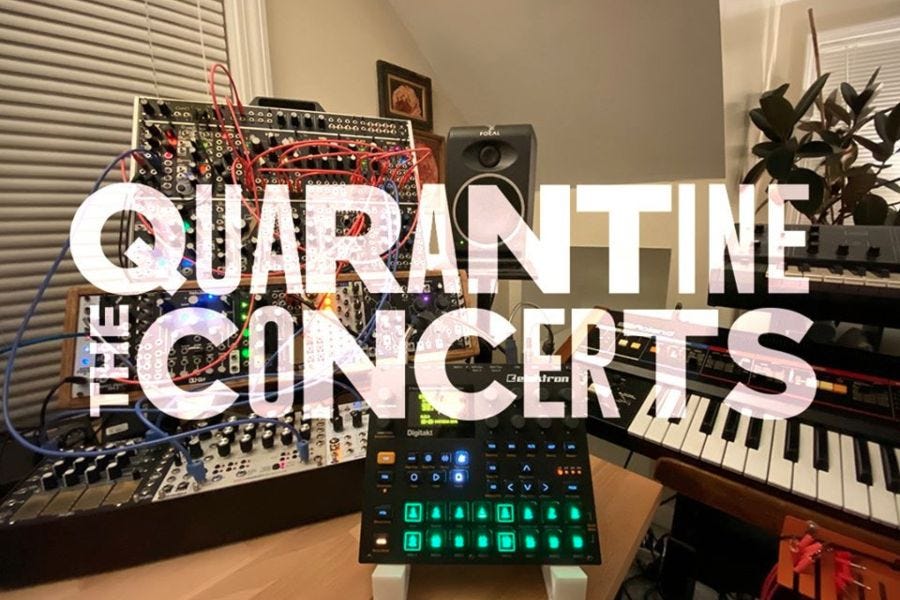Opera in Isolation
Some news, some listings for upcoming online events, and some thoughts on how contemporary opera is keeping pace with the present state of crisis…
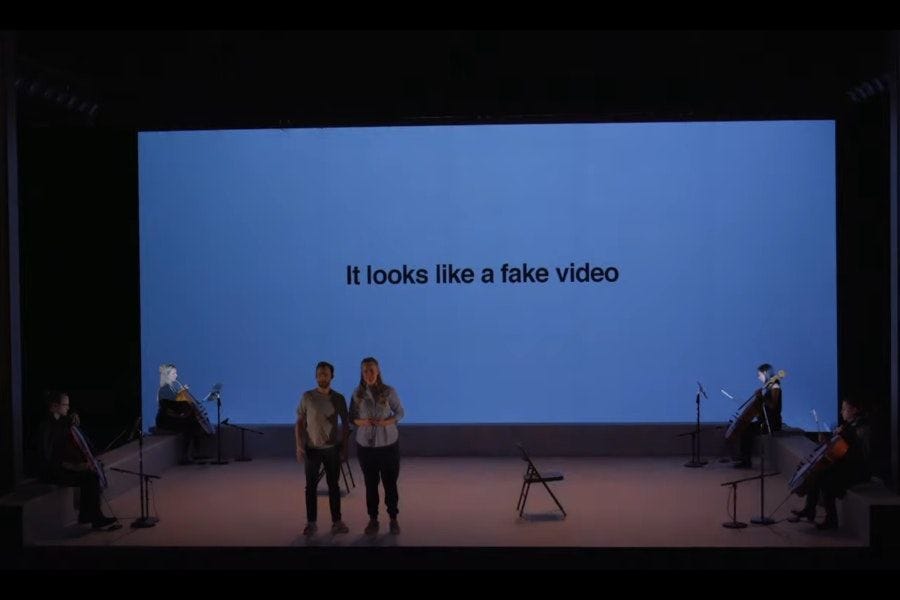
News! News! News!
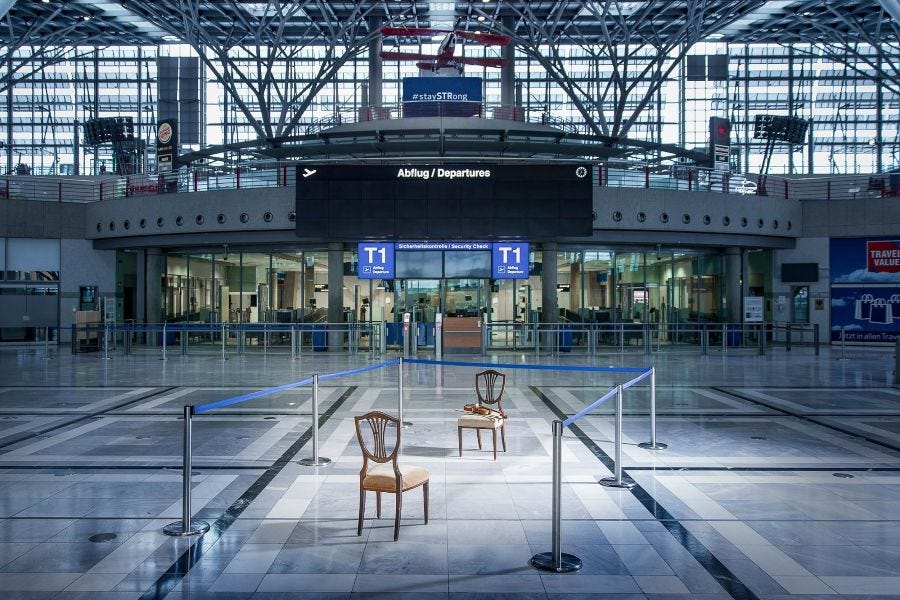
Most of us would go to great lengths to attend a concert right about now—but would you go to Stuttgart? It’s a rhetorical question for most of us, but if by chance you’ll be in the vicinity of Stuttgart Airport on May 8 or 10, you can attend one in a series of 10-minute concerts being staged there by members of the Stuttgart State Opera and SWR Symphony Orchestra. Inspired by the performance artist Marina Abramović’s The Artist Is Present, these concerts involve one performer, one audience member, and no talking; afterward, you’re asked to make a donation of any amount to the German nonprofit Deutsche Orchester-Stiftung. You can find out more (in German) on the airport’s website.
The online music-sales platform Bandcamp, which waived all administrative fees last Friday, May 1, during a 24-hour sale intended to direct more money to artists and labels, facilitated more than $7.1 million in new purchases and subscriptions. (In comparison, a previous such sale on March 20, which was bogged down by persistent server issues, generated $4.3 million.) Bandcamp already has announced two more fee-free sales dates, on June 5 and July 3.
Congratulations to the eminent composer, pianist, and educator Anthony Davis, who on Monday was named the recipient of the 2020 Pulitzer Prize for music for his most recent opera, The Central Park Five, which had its world-premiere production last summer at Long Beach Opera. One hopes fervently that, once the world returns to some semblance of normalcy, the opera will receive further productions. In the meantime, you can read an excellent feature written last June by Anne Midgette for the Washington Post, as well as a new article written by George Varga for the San Diego Union-Tribune after the award was announced, as well as reviews by Alex Ross in The New Yorker, Mark Swed in the Los Angeles Times, and Catherine Womack for National Sawdust Log.
The epic interview writer Joshua Minsoo Kim conducted with the protean musician Jim O’Rourke, published Monday on Kim’s Substack newsletter/blog Tone Glow, is an extraordinary achievement, urgently recommended.
The composer collective Wet Ink, which last Friday released a new album of compositions by founding members Alex Mincek and Sam Pluta, has launched Wet Ink Archive, a new monthly online publication devoted to the doings of its members and associates. According to an introductory essay by ensemble violinist and WIA editor Josh Modney, “The mission of Wet Ink Archive parallels that of the Ensemble: sharing the body of work generated within the group, celebrating the music of longtime collaborators, and providing a platform for emerging and underrepresented artists.” The first installment includes a timely conversation between Mincek and Pluta, as well as essays by cellist Mariel Roberts, a new member of the Wet Ink Ensemble, and vocal improviser/composer Charmaine Lee, a recent collaborator.
The ambitious, resourceful New Jersey Symphony Orchestra announced today that it has commissioned José Luis Domínguez, the Chilean conductor and composer who serves as artistic director of the New Jersey Symphony Orchestra Academy, to create a new piece for orchestra and chorus. Gratias Tibi is meant to honor the doctors, nurses, first responders, and essential workers fighting for public health during the COVID-19 pandemic. Members of the orchestra and the Montclair State University Singers will record their parts individually, for subsequent assembly; an online premiere, presented as part of the orchestra’s NJSO at Home series, is planned for June 8.
Streaming Highlights
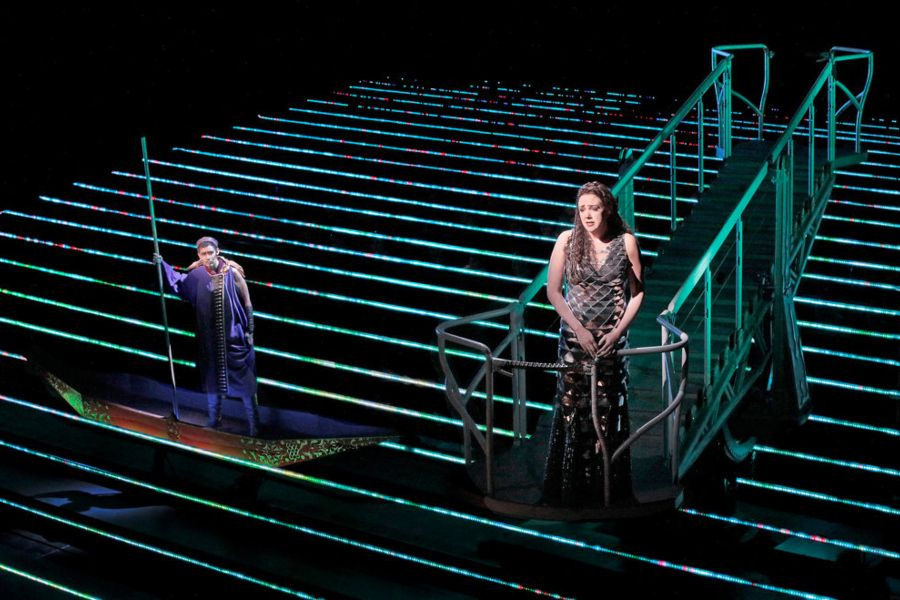
All times are given in Eastern Daylight Time, current for New York City.
May 6, 6:30pm, recorded: L’Amour de Loin, the mysterious and beautiful opera by composer Kaija Saariaho and librettist Amin Maalouf, is available to stream on the Metropolitan Opera website. Taped on December 10, 2016, the production is staged by Robert Lepage and conducted by Susanna Mälkki, and stars Susanna Phillips, Tamara Mumford, and Eric Owens. The stream is available for 24 hours. Free, with suggested donation. metopera.org
May 7, noon, recorded: Aging Magician, a poignant, family-friendly contemplation of mortality, the creative spark, and the passage of time, is the newest “Opera of the Week” from Beth Morrison Projects, the small, feisty company responsible for an oversize number of the 21st century’s most significant new operas. Created by composer Paola Prestini, writer-performer Rinde Eckert, and director-designer Julian Crouch, the piece is performed luminously by Eckert and the Brooklyn Youth Chorus, with a string quartet and musical set pieces constructed by Mark Stewart, during the work’s 2016 premiere run at the Walker Art Center in Minneapolis. Free, with suggested donation. bethmorrisonprojects.org
May 8-9, 9pm, live: The Chicago Jazz String Summit, curated by the cellist, composer, and bandleader Tomeka Reid, features four solo performances each evening. Friday’s lineup includes cellist Marika Hughes and Chris Hoffman, violist Jesse Zubot, and harpist Jacqui Kerrod; Saturday brings Kaethe Hostetter on violin, Tatsu Aoki on shamisen and cello, Sarah Bernstein on violin and bass, and Melanie Dyer on viola, violin, and bass. Free, with suggested donation; subscribers watch ad-free. ess.org/the-quarantine-concerts
May 10, 3pm, live: Billie Howard, the Chicago-based violinist and pianist behind the protean sound-art project Akosuen, presents a four-part matinee, starting with a solo set by Amanda Gutierrez beamed in from Dubai. Following are a duo set from Brooklyn string players Leah Asher and Maya Bennardo; a solo performance by Howard; and another Brooklyn duo, keyboardist-composers Teodora Stepančić and Assaf Gidron. Free, with suggested donation; subscribers watch ad-free. ess.org/the-quarantine-concerts
May 13, 7pm, recorded: The Scarlet Ibis, a chamber opera by composer Stefan Weisman and librettist David Cote produced at HERE Arts Center during the 2015 PROTOTYPE Festival, streams on Facebook during a live watch party presented as part of the HERE@HOME initiative. The video will remain online for on-demand streaming until the venue is able to reopen. Free, with suggested donation. facebook.com/hereartscenter
May 14, 6-10pm, live: The dynamic flute genius Claire Chase has participated in numerous online performance initiatives already, including a Corbett vs. Dempsey “Sequesterfest” bill and the inaugural 2020 Bang on a Can Marathon. Now comes a marathon all her own: a four-hour live concert featuring copious selections from her growing Density 2036 project, along with five surprise world premieres. Presented in collaboration with Music on the Rebound, the event is a benefit for the New Music Solidarity Fund. Suggested donation. musicrebound.com/marathon
Innovation in Isolation: New Opera Online
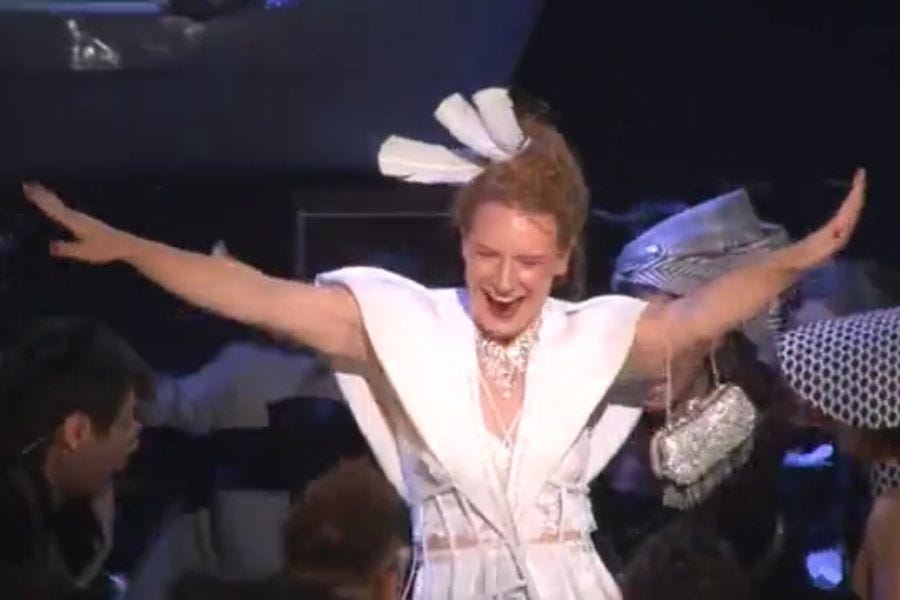
Angel’s Bone, the Pulitzer Prize-winning opera by composer Du Yun and librettist Royce Vavrek, was meant to open this month at LA Opera. Instead, the extraordinary work – a nightmarish allegory of child trafficking set to a polystylistic score, filmed in an especially fine production mounted by the Hong Kong New Vision Arts Festival in November 2018 – is playing, as I write this, on my iPhone.
The streaming video, hosted by LA Opera on its Facebook page and mirrored on the website of the work’s producer, Beth Morrison Projects, is part of an initiative meant to maintain public awareness for these organizations during their pandemic-forced closures—and to help raise much needed funds, as well. Angel’s Bone, the latest offering in an “Opera of the Week” series featuring past BMP productions, is available on-demand until tomorrow at noon (May 7 at 12pm EDT), when it will cede its place to Aging Magician, a poignant, family friendly creation by composer Paola Prestini, writer-performer Rinde Eckert, and director-designer Julian Crouch. (This show, too, had a prominent west coast staging at San Diego Opera shuttered by COVID-19.)
That opera faces a time of grave difficulty right now is plain to see. For evidence, one need look no further than coverage of the Metropolitan Opera, which dominates the news cycle by canceling its season, canceling pay for its musicians and stagehands, and furloughing employees. Yes, as Zachary Woolfe reported yesterday in The New York Times, nightly web streams of archived Met performances have attracted copious viewers, sparking 15 thousand new subscriptions to its on-demand video service.
Yet even with millions of dollars raised, and tens of thousands of new donors, the support may not be enough to ward off disastrous repercussions. No wonder so much of the company’s charmingly awkward, fleetingly incandescent At-Home Gala on April 25 felt achingly wistful, suggesting something gliding away, swanlike, regal and out of reach.
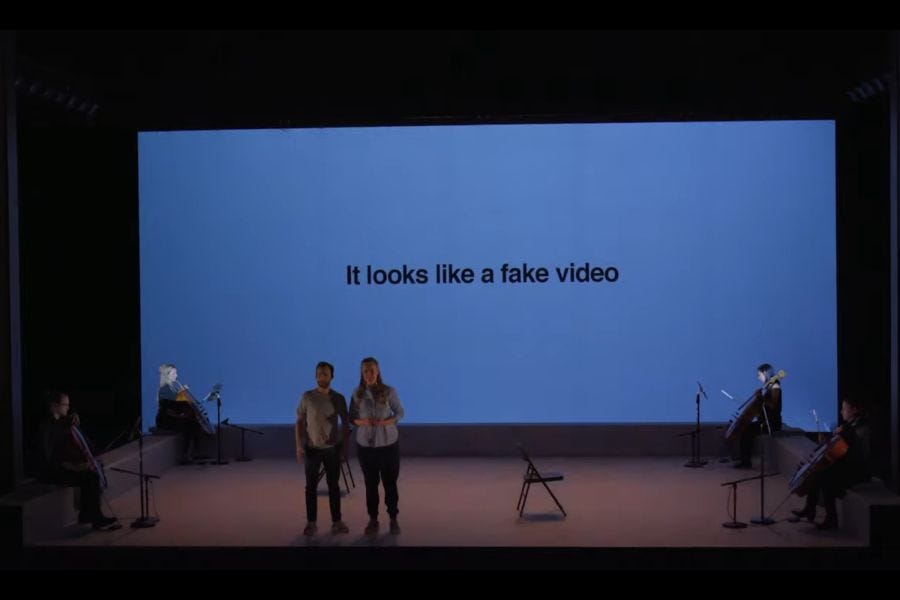
But some smaller companies have been quick to capitalize on the potential for captive audiences with broadband connections and time on their hands to sustain interest and, ideally, generate at least a trickle of life-sustaining funds. Beth Morrison Projects is one example; another is Opera Philadelphia, whose upcoming archival stream of Rossini’s Barbiere di Siviglia comes off as a quaint, quirky outlier in Digital Festival O, which otherwise comprises successful new works the company has fostered.
Through Friday, the company’s site is hosting an on-demand stream of Denis & Katya, an extraordinary chamber opera by composer Philip Venables and librettist-director Ted Huffman. If any work could be viewed as ideal for successful transition to presentation online, it might well be this economical firecracker, inspired by the true story of two vibrant, attractive teenage Russian lovers, who met their demise in a live-streamed stand-off with police.
Recounted in a series of fragmentary flashbacks, and punctuated with chirping projections of text messages exchanged by Venables and Huffman, the piece seems tailor-made for our age of extremely online consumption, the 24/7 media cycle, and fake news. The performances by mezzo-soprano Siena Licht Miller, baritone Theo Hoffman, and a quartet of cellists guided invisibly by music director Emily Senturia are sensational, and the imaginatively economical production is pitch perfect. (Trust me: don’t miss this.)
But beyond the growing number of novel works that are being streamed in filmed versions of earthbound productions is a trickle of newly created works designed expressly for the online medium, taking advantage of the capacities and liabilities of the tools we all are using to congregate safely these days. The same weekend that the Met mounted its regal evocation of conventional glories, two smaller organizations offered wickedly entertaining world premieres.
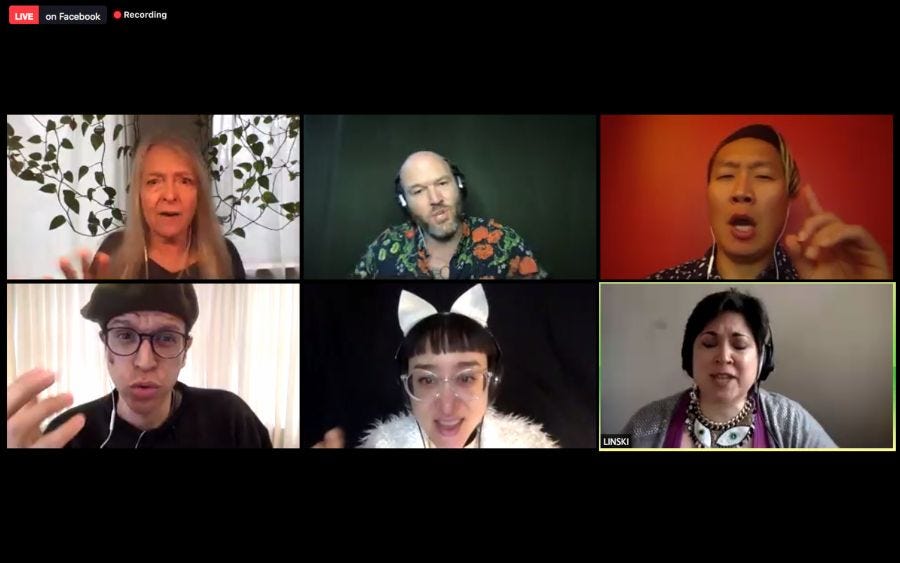
Mounted literally via Zoom conference, all decisions will be made by consensus used its medium as a springboard to reflect on… well, its medium, but also, on a deeper level, with the difficulty of communicating, and of having a say within a group dynamic. The work, conceived by composer-vocalist Kamala Sankaram, librettist Rob Handel, and director Kristin Marting – artistic director of HERE Arts Center, and a founding director of the PROTOTYPE Festival – was presented live three times, on April 24, 25, and 26.
Sankaram and Handel, who’d collaborated previously on several works (most recently the covert-web whistleblower thriller, Looking at You), packed plenty of personality into the compact confines of this 15-minute opera (operina?). From a musical perspective, the work melded and extended techniques developed by Robert Ashley and Anthony Braxton, matching weightless electronics with amusingly gabby vocal lines.
A distinguished six-member cast – Sankaram, Paul An, Hai-Ting Chinn, Zachary James, Joan La Barbara, and Adrian Rosas – amiably conveyed a vaguely conspiratorial plot sketch, while Sankaram’s aleatoric score aptly accommodated the unmoored float and lag of online communications. Muting and freezing were features, not bugs, and a blustering incursion by Joel Marsh Garland, whose character briefly wanders into the wrong conference, riffed amusingly on a phenomenon that, only a few weeks later, already has revealed the potential for gross abuse.
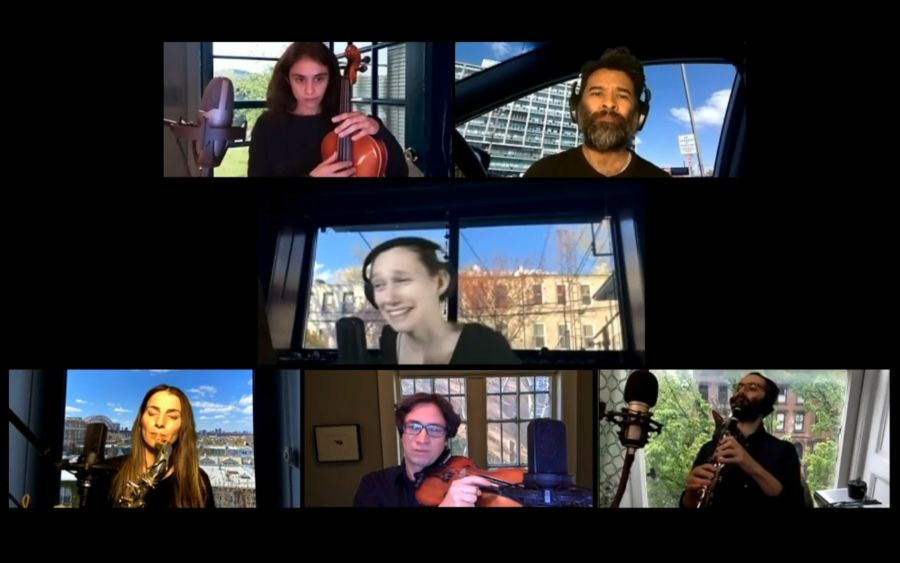
Performed on the same three days – and designated as an “opera” by the music-theater performance-art troupe thingNY – subtracTTTTTTTTT was altogether less tidy, less linear, and far more unhinged. A series of vignettes in swift succession by six singing instrumentalists – Gelsey Bell, Isabel Castellvi, Paul Pinto, Erin Rogers, Dave Ruder, and Jeffrey Young – the new piece replaced a scrapped revival of the first thingNY opera, the even more fragmented ADDDDDDDDD.
The show encompassed beatnik caterwauling and slapstick mugging, amplified beard stroking and viscous drool. There was a quietly virtuosic recitation by Young, and a beautiful auto-tuned ballad by Pinto, performed with dizzying digital mirroring effects. There also was deep poignancy, again and again: in lines of text spoken or sung by Bell, in simulated backgrounds of sunny Brooklyn skies, and in the incorporation of New York City’s clangorous nightly 7pm salute to doctors, nurses, and essential workers on the front lines of the present pandemic.
The final presentations of both of these shows are preserved now for on-demand viewing, staking claims on virtual posterity just as the Metropolitan Opera and Beth Morrison Projects and Opera Philadelphia have done. (You’ll find all decisions will be made by consensus on Facebook, and subtracTTTTTTTTT on YouTube.) I’m glad to see that thingNY has retained the dress rehearsal and candid banter that preceded their show, and wish that the consensus crew had included in their archived presentation an example of the revealing Q&A that followed each performance.
Despite the novel circumstances that prompted and shaped these shows, what they share in common – with each other, and with every opera, ever – is a palpable sense of existing in the moment. Having watched all three performances of both operas during that especially rich weekend, I delighted in the inconsistencies and idiosyncrasies that set one performance apart from another, as well as the different viewpoint available depending on which gadget and platform one elected to use.
Given that unpredictability and serendipity help to define any live art form, then consensus and subtracTTTTTTTTT aren’t contingency plans at all—they’re evolution. They won’t, and shouldn’t, replace theater as an adventure in shared physical space, but they do offer a rich new liminal space where fresh and vital work can be made.
Coming up next…
Staff and associates of Chicago’s Experimental Sound Studio talk about The Quarantine Concerts, the ambitious concert series it presents nearly nightly on Twitch, bringing a diverse array of artists to a global audience in isolation.



